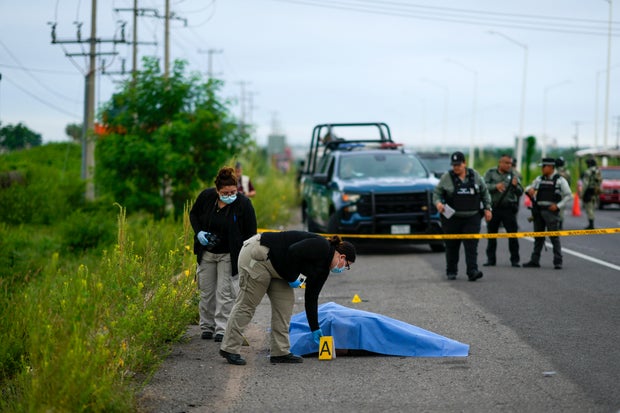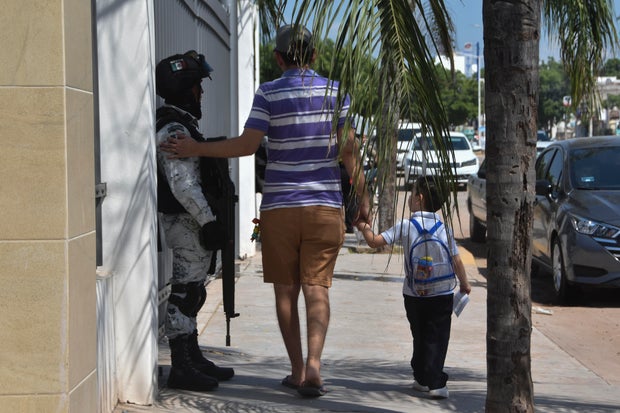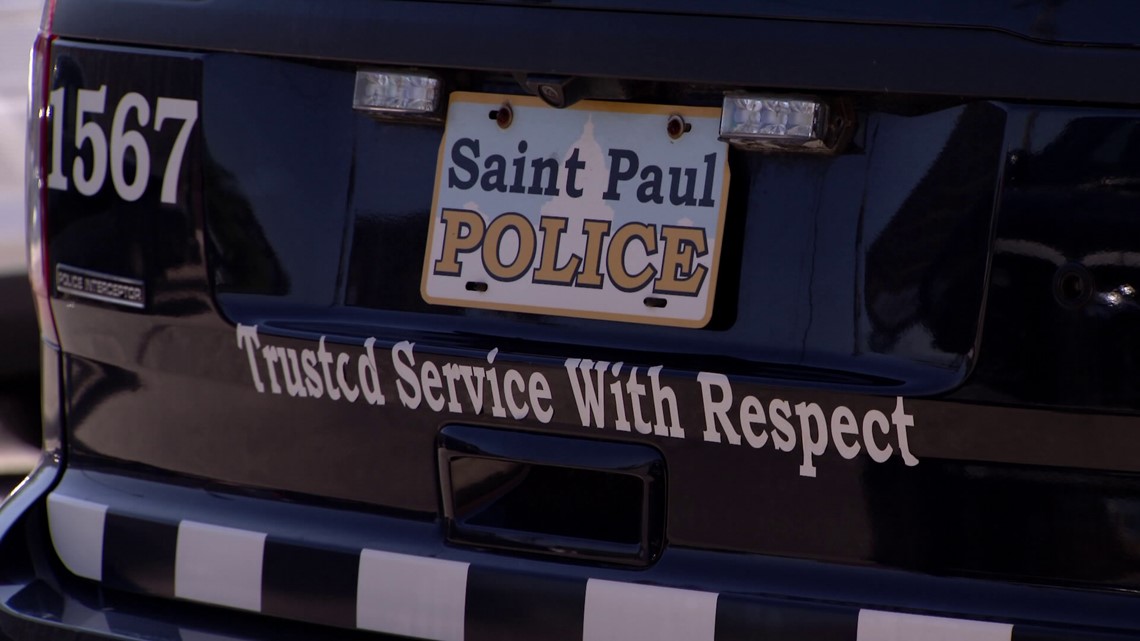CBS News
Why cellphone chats have become death sentences in cartel stronghold in Mexico

Cellphone chats have become death sentences in the continuing, bloody factional war inside Mexico’s Sinaloa drug cartel.
Cartel gunmen stop youths on the street or in their cars and demand their phones. If they find a contact who’s a member of a rival faction, a chat with a wrong word or a photo with the wrong person, the phone owner is dead.
Then, they’ll go after everyone on that person’s contact list, forming a potential chain of kidnapping, torture and death. That has left residents of Culiacan, the capital of Sinaloa state, afraid to even leave home at night, much less visit towns a few miles away where many have weekend retreats.
“You can’t go five minutes out of the city, … not even in daylight,” said Ismael Bojórquez, a veteran journalist in Culiacan. “Why? Because the narcos have set up roadblocks and they stop you and search through your cellphone.”
And it’s not just your own chats: If a person is traveling in a car with others, one bad contact or chat can get the whole group kidnapped.
That’s what happened to the son of a local news photographer. The 20-year-old was stopped with two other youths and something was found on one of their phones; all three disappeared. Calls were made and the photographer’s son was finally released, but the other two were never seen again.
Eduardo Verdugo / AP
Residents of Culiacan had long been accustomed to a day or two of violence once in a while. The presence of the Sinaloa cartel is woven into everyday life there, and people knew to stay indoors when they saw the convoys of double-cab pickups racing through the streets.
But never have they seen the solid month of fighting that broke out Sept. 9 between factions of the Sinaloa cartel after drug lords Ismael “El Mayo” Zambada and Joaquín Guzmán López were apprehended in the United States after flying there in a small plane on July 25.
Zambada claimed he was kidnapped and forced aboard the plane by Guzmán López, causing a violent battle between Zambada’s faction and the “Chapitos” group led by the sons of imprisoned drug lord Joaquin “El Chapo” Guzmán. “El Chapo” is serving a life sentence in a maximum security prison in Colorado after being convicted in 2019 on charges including drug trafficking, money laundering and weapons-related offenses.
Zambada pleaded not guilty last month in New York in a drug trafficking case that accuses him of engaging in murder plots and ordering torture.
New generation of drug lords and a “chain of hunting”
Residents of Culiacan are mourning their old lives, when the wheels of the local economy were greased by cartel wealth but civilians seldom suffered – unless they cut off the wrong pickup truck in traffic.
But recently, bodies have appeared across Culiacan, often left slung out on the streets or in cars with either sombreros on their heads or pizza slices or boxes pegged onto them with knives. The pizzas and sombreros have become informal symbols for the warring cartel factions, underscoring the brutality of their warfare.
Juan Carlos Ayala, an academic who studies the anthropology of the drug trade at the Autonomous University of Sinaloa, said that following the arrests of Guzmán López and Zambada in July, a new generation of younger, more flashy and cosmopolitan drug lords have taken over.
They fight with extreme violence, kidnapping and cellphone tracking – not the old kind of handshake deals their elders used alongside shootouts to settle matters.
“There is a new generation of leaders of drugs and organized crime here, that has other strategies,” Ayala said. “They see that the tactic of shootouts hasn’t worked for them, so they go for kidnapping.”
“They catch one person, and he has messages from the rival group,” said Ayala. “So they go after him to squeeze more information, and that starts a chain of hunting, to catch the enemy.”
The new tactics are reflected in the huge wave of armed carjackings in and around Culiacan. Cartel gunmen used to steal the SUVs and pickups they favor for use in cartel convoys; but now they focus on stealing smaller sedans.
They use these to go undetected in their silent, deadly kidnappings.
Often, the first a driver knows is when a passing car tosses out a spray of bent nails to puncture his tires. Vehicles pull up front and rear to cut him off. The driver is bundled into another car. All that is left for neighbors to find is a car with burst tires, the doors open, the engine running, in the middle of the street.
/ AP
The State Council on Public Safety, a civic group, estimates that in the past month there have been an average of six killings and seven disappearances or kidnappings in and around the city every day. The group said about 200 families have fled their homes in outlying communities because of the violence.
Culiacan is no stranger to violence — a shooting broke out across the city in October 2019 when soldiers mounted a failed attempt to arrest another of Chapo Guzmán’s sons, Ovidio. Fourteen people were killed that day.
A few days later, civic activist Estefanía López arranged a peace march and 4,000 residents turned out for it. When she tried to do something similar this year, she could get only about 1,500 people to attend a similar demonstration.
“We got a lot of messages beforehand from a lot of people who said they wanted to join and march, to support the cause, but who were afraid to come,” López said.
There’s reason to be afraid: Last week, gunmen burst into a Culiacan hospital to kill a patient previously wounded by gunshots. In a town north of Culiacan, drivers were astonished to see a military helicopter seeking to corral four gunmen in helmets and tactical vests just yards from a highway; the gunmen were shooting back at the chopper.
The government’s response to all this has been to blame the United States for stirring up trouble by allowing the drug lords to turn themselves in, and to send in hundreds of army troops.
But irregular urban combat in the heart of a city of 1 million inhabitants – against a cartel that has lots of .50-caliber sniper rifles and machine guns – is not the army’s specialty.
Squads of soldiers went into a luxury apartment complex in the city’s center to detain a suspect and they wound up shooting to death a young lawyer who was merely a bystander.
López, the peace activist, has been asking for soldiers and police to be posted outside schools, so children can return to classes – most are currently taking classes online because their parents judge it too dangerous to take them to school.
But police can’t solve the problem: Culiacan’s entire municipal force has been temporarily disarmed by soldiers to check their guns, something that’s been done in the past when the army suspects policemen are working for drug cartels.
The local army commander recently acknowledged that it’s up to the cartel factions – not authorities – when the violence will stop.
“In Culiacan, there is not even faith anymore that we will be safe, with police or soldiers,” López said, noting that that has had a clear effect on daily life and the economy. “A lot of businesses, restaurants and nightclubs have been closed for the past month.”
Laura Guzmán, the leader of the local restaurant chamber, said about 180 businesses in Culiacan have closed, permanently or temporarily, since Sept. 9 and almost 2,000 jobs have been lost.
Local businesses tried to organize evening “tardeadas” – long afternoons – for residents who were afraid to go out after dark, but they didn’t draw enough customers.
“Young people are not interested in going out right now,” Guzmán said.
For those looking to get away from the violence temporarily, the seaside resort of Mazatlan used to be only 2½ hours away by car. But that’s not an option since last month when cartel gunmen hijacked passenger buses, forced the tourists off and burned the vehicles to block the road to Mazatlan.
That leaves just one option, and one only open to some.
“Those who have the economic resources get out of the city by airplane to take a break,” Guzmán said.
CBS News
11/16: Saturday Morning – CBS News

Watch CBS News
Be the first to know
Get browser notifications for breaking news, live events, and exclusive reporting.
CBS News
McDonald’s investing $100 million to lure customers back to the fast food giant after E. coli outbreak

McDonald’s is investing $100 million to bring customers back to stores after an outbreak of E. coli food poisoning tied to onions on the fast-food giant’s Quarter Pounder hamburgers.
The investments include $65 million that will go directly to the hardest-hit franchises, the company said.
The U.S. Centers for Disease Control and Prevention has said that slivered onions on the Quarter Pounders were the likely source of the E. coli. Taylor Farms in California recalled onions potentially linked to the outbreak.
The E. coli outbreak has sickened 104 people in 14 states, federal health officials said in an update on Wednesday.
At least 34 people have been hospitalized, and four developed hemolytic uremic syndrome (HUS), a serious condition that can cause kidney failure. An 88-year-old man who resided in Grand Junction, Colorado, died, as previously reported. The illnesses began at the end of September, and the most recent onset of illness occurred as of Oct. 21, according to the U.S. Food and Drug Administration.
The Food and Drug Administration has said that “there does not appear to be a continued food safety concern related to this outbreak at McDonald’s restaurants.”
However, the outbreak hurt the company’s sales.
Quarter Pounders were removed from menus in several states in the early days of the outbreak.
In a statement Wednesday obtained by CBS News, McDonald’s said it had found an “alternate supplier” for the approximately 900 restaurants that had temporarily stopped serving Quarter Pounders with slivered onions.
“Over the past week, these restaurants resumed the sale of Quarter Pounder burgers with slivered onions,” McDonald’s said.
CBS News reached out to McDonald’s on Saturday for a statement regarding the reported investment.
CBS News
U.S. health officials report 1st case of new form of mpox in a traveler

Health officials said Saturday they have confirmed the first U.S. case of a new form of mpox that was first seen in eastern Congo.
The person had traveled to eastern Africa and was treated in Northern California upon return, according to the California Department of Public Health. Symptoms are improving and the risk to the public is low.
Mpox is a rare disease caused by infection with a virus that’s in the same family as the one that causes smallpox. It is endemic in parts of Africa, where people have been infected through bites from rodents or small animals.
Earlier this year, scientists reported the emergence of a new form of mpox in Africa that was spread through close contact including through sex.
More than 3,100 confirmed cases have been reported just since late September, according to the World Health Organization. The vast majority of them have been in three African countries – Burundi, Uganda, and the Democratic Republic of the Congo.
Since then, cases of travelers with the new mpox form have been reported in Germany, India, Kenya, Sweden, Thailand, Zimbabwe, and the United Kingdom.
Health officials earlier this month said the situation in Congo appears to be stabilizing. The Africa Centers for Disease Control and Prevention has estimated Congo needs at least 3 million mpox vaccines to stop the spread, and another 7 million vaccines for the rest of Africa.
The current outbreak is different from the 2022 global outbreak of mpox where gay and bisexual men made up the vast majority of cases.











